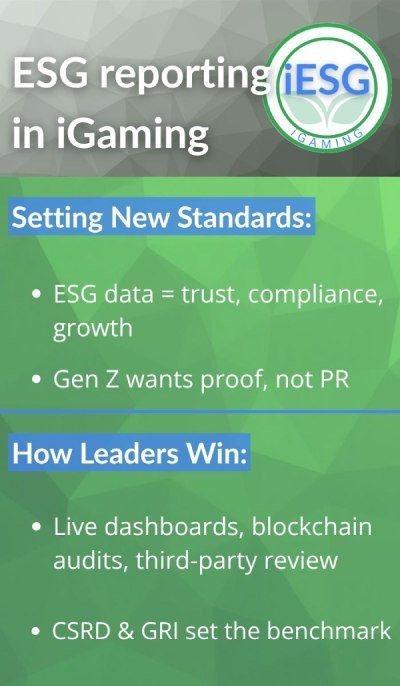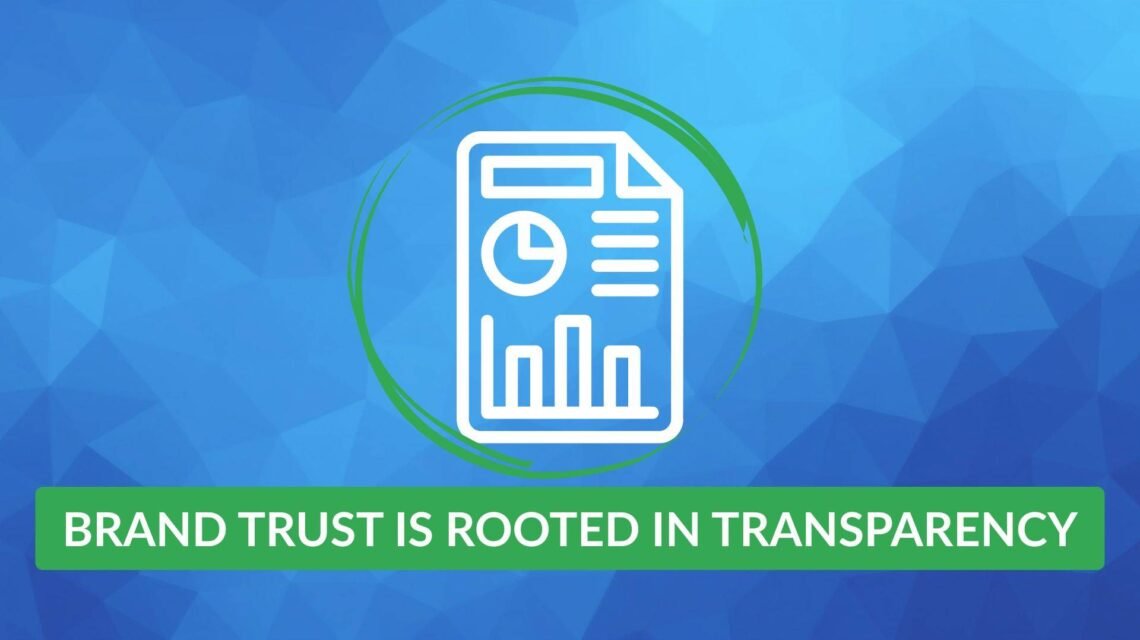ESG reporting in iGaming is no longer just a thing for closed boardrooms and industry panels. It’s no longer a formality. It’s becoming a mark for credibility. This wasn’t an overnight change. For years, plenty of people doubted whether ESG would ever move past the buzzwords. But those days are gone. Today, it’s not just talk; regulators are tightening the rules, investors are raising their standards, and younger players want real action, not just polished PR.
It’s a shift that’s reshaping the industry for good. The latest industry reviews say it plainly: operators who put ESG reporting in iGaming at the heart of their strategy, not just as an afterthought, are pulling ahead on reputation, investment, and long-term resilience¹. The EU’s Corporate Sustainability Reporting Directive (CSRD) has only raised the bar, making detailed, verifiable sustainability data the new standard³. At this point, any operator serious about growth can’t afford to sit this one out.
Gen Z and millennials place genuine value on sustainability and governance. For them, brand trust is rooted in transparency, not clever marketing.2
Key Elements of Effective ESG Reporting in iGaming
This isn’t about a “checking boxes” exercise. The front-runners in iGaming know that solid ESG reporting in iGaming means committing to real standards. Frameworks like the Global Reporting Initiative (GRI), Sustainability Accounting Standards Board (SASB), and the CSRD are now referenced as benchmarks by investors and regulators alike.3 The more sophisticated the operation, the more granular the data. Here’s what that looks like:
Environmental: No more sweeping statements. Reports now break down energy usage, show actual reductions in data center emissions, and highlight progress on renewable sourcing.4 Some operators are publishing live dashboards tracking server efficiency and carbon footprint … a level of detail that sets the bar for everyone else.
Social: Transparency around player protection, staff diversity, and community investment isn’t optional anymore. Operators sharing real numbers, like annual progress in responsible gambling or genuine shifts in leadership diversity, stand out for the right reasons².
Governance: ESG reporting in iGaming now regularly features independent AML audits, detailed data privacy measures, and actual diversity statistics for boards and executives¹.
Gone are the days when a single policy could tick the governance box. The expectation now is for continuous, third-party-verified progress.
None of this is theoretical. Blockchain-backed audits, real-time ESG dashboards, and open publication of annual sustainability reports are now live in-market.4 The message is clear: credibility must be earned, and data is the only currency that counts.
💡 The iESG Assessment reflects how ESG reporting in iGaming is evaluated in practice, focusing on whether governance, responsible gambling, and AML controls are clearly documented, evidence-based, and consistently applied.
Challenges and Solutions in ESG Data Disclosure

The technical and operational challenges of ESG reporting in iGaming are real. Anyone claiming otherwise isn’t being honest … Operators are juggling everything from outdated systems and scattered data to a patchwork of regional rules that never seem to stand still. And when real-time reporting enters the mix, it’s no wonder ESG data management can feel like trying to hit a moving target.
But as the challenges pile up, so do the solutions. This industry never stands still, it adapts, often just as quickly (or even faster) than the rules themselves¹.
ESG reporting in iGaming – a New Era
Industry leaders are embracing ESG management platforms. What are they? Cloud-based solutions that aggregate, validate, and prep data for audit in a fraction of the time legacy systems allowed. Third-party audits, once a cost to be minimized, are now seen as value multipliers.1 Operators leveraging blockchain to secure ESG data points aren’t doing so for headlines; they’re doing it to future-proof compliance and build defensible trust.
Annual reports don’t cut it anymore. Today’s stakeholders want to see steady, honest progress—updates that not only spotlight the big wins but also acknowledge the bumps along the way. Brands like Betsson, who are transparent about both their successes and their setbacks, end up building a reputation that actually sticks⁵.
This isn’t just a formality avoiding risk. Done right, ESG reporting in iGaming has become a genuine driver of growth and trust. In fact, one of the best ways for iGaming brands to set themselves apart. The operators putting out clear, credible ESG data are the same ones opening doors to new investors, building stronger loyalty, and making regulatory headaches a thing of the past. This isn’t speculation. BDO’s 2024 review tracked higher capital inflows and customer retention among operators with leading ESG practices.1
🏅 For operators moving beyond one-off disclosures, iESG Membership supports ESG reporting as a continuous process through structured guidance, benchmarking, and practical resources.
It helps teams embed governance, player protection, and sustainability controls into day-to-day operations.
ESG Reporting in iGaming: Regulatory Advantage
ToThe regulatory advantage matters, too. In a sector where licensing, renewals, and new market entry are often at stake, the quality of ESG reporting can tip the balance.3 The field is getting crowded. Transparent operators don’t just keep up … they set the agenda, drive the narrative, and lead the dialogue with regulators and stakeholders alike.
Brands that treat ESG reporting in iGaming as a strategic asset, backed by data, not declarations are already defining the sector’s future.
Conclusion
There’s no going back. ESG reporting in iGaming has become the measure of serious intent. It’s separating those ready to shape the industry from those content to follow. The rules are changing. Operators who invest in robust systems, transparent metrics, and continuous improvement will be rewarded with trust, partnership, and a brand that lasts.
In a market that scrutinizes every move, leadership belongs to those who report what matters and prove it, every time.
FAQ – ESG Reporting in iGaming
What does ESG reporting in iGaming involve?
ESG reporting in iGaming means structured, independently verified disclosure of environmental, social, and governance metrics, covering everything from carbon footprint to player protection.
Why is transparency critical for ESG reporting in iGaming?
Because trust, compliance, and long-term loyalty depend on open, accurate data.
Which standards shape ESG reporting in iGaming?
GRI, SASB, and CSRD are key frameworks, recognized globally and by local regulators.
How is credible ESG reporting verified?
Most leading operators use third-party audits, digital dashboards, and increasingly blockchain for data integrity.
What’s the practical business value of ESG reporting in iGaming?
Strong ESG reporting in iGaming unlocks capital, drives retention, and makes regulatory processes more efficient.
Sources:
- BDO: “ESG Strategy for Gaming”
https://www.bdo.com/insights/industries/gaming-leisure/gaming-companies-unlock-the-power-of-esg-strategy-and-investment - PwC: “Voice of the Consumer Survey 2024”
https://www.pwc.com/gx/en/news-room/press-releases/2024/pwc-2024-voice-of-consumer-survey.html - European Commission: “Corporate Sustainability Reporting Directive (CSRD)”
https://ec.europa.eu/info/business-economy-euro/company-reporting-and-auditing/company-reporting/corporate-sustainability-reporting_en - Kindred Group: “Sustainability Reporting“
https://www.kindredgroup.com/sustainability/sustainability-reporting/ - Betsson Group: “Sustainability Initiatives“
https://www.betssonab.com/sustainability/

